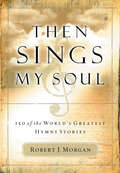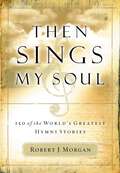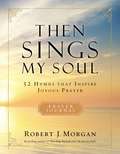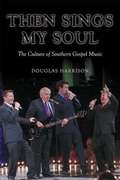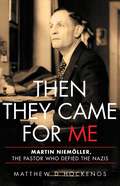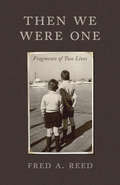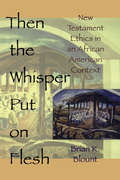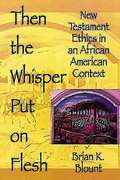- Table View
- List View
Then Sings My Soul: 150 Of The World's Greatest Hymn Stories
by Robert MorganRob Morgan's inimitable style will help people reacquaint themselves with the hymns of the faithful. His goal is to keep these traditional hymns vital and meaningful to all generations.Don't look for a dry recounting of boring stories. These devotional-style stories show the emotion and drama behind the hymns of faith that have changed many lives throughout history -- the people whose faith led them to write these wonderful hymns and the people whose faith was affected by reading, hearing, and singing the songs. Designed to be personally reflective, these stories speak to your soul and add depth and meaning as you worship God through song.FEATURES:Includes words and music to each hymnSpecial softcover, french flap cover designIvory paper with brown inkJagged-edge paper, giving it a classic feelComplete with hymn indexUse for devotionals, teaching illustrations, introductory remarks for song leaders and music ministers
Then Sings My Soul: 150 of the World's Greatest Hymn Stories
by Robert J. MorganOver one million copies sold! Have you ever wanted to learn more about hymns, but weren't sure where to start? Bestselling author Robert J. Morgan shares the incredible stories behind the beloved traditional hymns of faith.Each week millions of Christians around the world use hymns composed by believers from every era and branch of Christianity to join voices in praise—singing psalms and hymns and making melody in their hearts to praise the Lord.Pastor Robert Morgan's goal is to keep these traditional hymns vital and meaningful to all generations. Then Sings My Soul will help readers reacquaint themselves with 150 beloved hymns of the faithful. These devotional-style stories show the emotion and drama behind the hymns of faith that have changed many lives throughout history—from the people whose faith led them to write these wonderful hymns to the people whose faith was affected by reading, hearing, and singing them.As we sing a new song to the Lord, let's not forget the old ones. It's the sturdy old hymns of the faith that strengthen and steady us when we are weary and worn. They're the ones we sing when rising troubled in the night.Then Sings My Soul contains:Words and music to 150 traditional hymnsShort, devotional-style stories providing context on each hymnHymn index for easy referencePerfect for use as a daily devotional, teaching illustration, or for song leaders and music ministersAn instant classic with more than 1.3 million copies sold, Then Sings My Soul is designed to be personally reflective. These lyrics and stories behind them will speak to your soul, strengthen your faith, and deepen your understanding of God as you worship Him through song.
Then Sings My Soul: 52 Hymns that Inspire Joyous Prayer
by Robert J. MorganA year of journaling inspiration through the most beloved hymns, based the bestselling Then Sings My Soul series.Pastor Rob Morgan's inimitable style will help people reacquaint themselves with the hymns of the faithful. His goal is to keep these traditional hymns vital and meaningful to all generations. Hymns speak to our soul and add depth and meaning as we worship God through song.This year-long devotional journal shares the emotion behind the hymns of faith that have changed many lives throughout history — not only the people whose faith led them to write these wonderful hymns but also the people whose faith has been transformed by reading, hearing, and singing the songs. Designed to be personally reflective and inspire prayer, each week-long experience allows readers to experience the hymn through:reflection questionsprayer promptsjournaling spacehistoric quotesthe actual hymn with music and lyricsits historical backgroundDraw near to God and deepen your prayer life as you make your way through these 52 hymns that center around the theme of joyous prayer in the Then Sings My Soul Prayer Journal.
Then Sings My Soul: The Culture of Southern Gospel Music (Music in American Life)
by Douglas HarrisonIn this ambitious book on southern gospel music, Douglas Harrison reexamines the music's historical emergence and its function as a modern cultural phenomenon. Rather than a single rhetoric focusing on the afterlife as compensation for worldly sacrifice, Harrison presents southern gospel as a network of interconnected messages that evangelical Christians use to make individual sense of both Protestant theological doctrines and their own lived experiences. Harrison explores how listeners and consumers of southern gospel integrate its lyrics and music into their own religious experience, building up individual--and potentially subversive--meanings beneath a surface of evangelical consensus. Reassessing the contributions of such figures as Aldine Kieffer, James D. Vaughan, and Bill and Gloria Gaither, Then Sings My Soul traces an alternative history of southern gospel in the twentieth century, one that emphasizes the music's interaction with broader shifts in American life beyond the narrow confines of southern gospel's borders. His discussion includes the "gay-gospel paradox"--the experience of non-heterosexuals in gospel music--as a cipher for fundamentalism's conflict with the postmodern world.
Then They Came for Me: Martin Niemöller, the Pastor Who Defied the Nazis
by Matthew D Hockenos"First they came for the Communists, and I did not speak out-Because I was not a Communist..." Few today recognize the name Martin Niemöller, though many know his famous confession. In Then They Came for Me, Matthew Hockenos traces Niemöller's evolution from a Nazi supporter to a determined opponent of Hitler, revealing him to be a more complicated figure than previously understood. Born into a traditionalist Prussian family, Niemöller welcomed Hitler's rise to power as an opportunity for national rebirth. Yet when the regime attempted to seize control of the Protestant Church, he helped lead the opposition and was soon arrested. After spending the war in concentration camps, Niemöller emerged a controversial figure: to his supporters he was a modern Luther, while his critics, including President Harry Truman, saw him as an unrepentant nationalist. A nuanced portrait of courage in the face of evil, Then They Came for Me puts the question to us today: What would I have done?
Then We Were One
by Fred A. ReedSouthern California in the late 1950s has the look and feel of a midsummer morning-bright and still. For two young brothers, the wide world is full of promise. Together they set out to explore it as one, ever alert to the sound of their mother's whistle calling them home. But by late afternoon, dark clouds gather on the horizon and the storm soon breaks.That storm is the war in Vietnam, and its fury sweeps away all the noble lies of the social conservatism their parents endorsed.Then, in a bookstore on Hollywood Boulevard, the eldest son happens upon a novel by Kazantzakis that entices him to Greece. There, he learns the language, and in that ancient land that has seen it all, heard it all, and done it all, he encounters militant Cretan students and the woman who will become his life partner in exile.But for the younger brother there will be no escape. Trapped by failed marriages, smothered by parental guidance and an education system exposed as the state's recruiting agent, he is dispatched to Vietnam. Fifteen years later he lies buried on a lonely hillside in New Zealand, dead of the wounds he sustained in that war.Shocked by the death of his younger brother, Fred Reed sets out on a series of journeys of discovery and understanding. By way of Iran in the aftermath of the Islamic Revolution; the Anatolian highlands of the mystic Bediuzzaman Said Nursi; in pursuit of ancient and modern iconoclasts in Syria and Lebanon; he comes under the spell of Islam. In its embrace he finds a renewed brotherhood; in its discipline, liberation.Then We Were One challenges us with its conclusion that indictment, absolution and redemption, though we must seek them, are not ours to ultimately possess.
Then the Whisper Put On Flesh: New Testament Ethics in an African American Context
by Brian K. BlountDevastating circumstances still enslave most African Americans in American society today, especially in urban environments. They struggle with economic devastation, family disintegration, black-on-black crime, unemployment, political and social injustice, as well as the structural racism that fuels all of these. In the midst of this horrible din, there is a whisper from the Lord, a faith statement upon which there can be established an ethic of transformation for an oppressed African American Christian community. The whispers of faith, hope, and ethical direction that flow out of the New Testament materials have always taken their fleshly shape in light of the context in which African Americans have found themselves. Blount studies selected New Testament texts and evaluates them in light of their first-century contexts, primarily from a socio-linguistic perspective, and then reads them through the eyes of the contemporary African American Christian. This study analyzes the differences between the first century context, which prompted the biblical writers to reflect ethically upon their faith statements as they did, and the present reality of African Americans in the United States, which motivates their Christian leaders to reflect upon these same statements in such radically different ways. An example of a twentieth-century ethical situation is Martin Luther King, Jr.'s campaign of civil disobedience which appeared to be in direct contradiction to the ethical prescriptions in Romans 113 and 1 Peter 2:13-17, which mandate unqualified Christian obedience of government. Blount urges African American Christians to continually reevaluate the ethical principles established for first-century biblical communities in light of the novel circumstances that prevail today. In so doing, African Americans will be giving flesh to the inspirational whisper of the New Testament.
Then the Whisper Put on Flesh: New Testament Ethics in an African American Context
by Brian K. BlountIn the midst of this horrible din, there is a whisper from the Lord, a faith statement upon which there can be established an ethic of transformation for an oppressed African American Christian community.
Thendral Aug 2009
by Chitra Vaitheeswaran Radha MohanThendral is a monthly magazine for Tamilians. It has an interesting collection of articles featuring a health column, a cooking column, religion, etc
Thendral Vol 13 Issue 10 September 2013
by MadhurabharathiThis issue features interview of Madurai R. Muralidharan and film actor Rajesh, Biography of Kaviyogi Suddhananda Bharathiyar, an article on Writer Kanmani Gunasekaran with one of his short stories, “Sarugu”, Three short stories, a religious article on Thiruvaiyaru Iyarappar, plus usual features of Thendral Pesukirathu, Anbulla Snehitiye, Nalam Vaazha, Kathiravanai Kelungal, Ilanthendral, etc.
Thendral: Vol 10, Issue 09, August 2010
by MadhurabharathiThis issue features interviews of Hema Rajagopalan and Dr.Ira.Nagasamy, Coriander Dosai by Kala Gnanasambhandam, Anbulla Snehitiye by Chithra Vaitheeswaran, Valam Tharum Varalakshmi by Sita Durairaj etc.
Thendral: Vol 10, Issue 10, September, 2010
by MadhurabharathiThis issue features interview of Dr.Era.Nagasamy, Articles on famous writers of 50s Late Devan and Kothamangalam Subbu, Mouthwatering Recipe of Paruppu Urundai Morkuzhambu, Counseling Column of Anbulla Snehitiye, Three short stories, Jokes etc.
Thendral: Vol 11, Issue 01, December 2010
by MadhurabharathiThis issue features Interviews of Anu Natarajan, Dr. Prasad Srinivasan, Actor Nasser; Biography of famous Carnatic Musician G.N. Balasubramaniam and Writer Sandilyan; Three short stories; Nostalgia on Kanchi seer Maha Periyava; a spiritual article on Gunaseelam Sri Prasanna Venkatesa Perumal; Two recipes with Tomatillo and other usual features such as Anbulla Snehitiye, Nalam Vaazha, Kathiravanai Kelungal, Jokes, etc.
Thendral: Vol 11, Issue 02, January 2011
by MadhurabharathiThis issue contains Interviews of G. Asokan and Dr. Balaji Sampath, an article on Pandit Gopala Iyer and Muthu Srinivasan, nostalgia on Pope John Paul II, Four Short Stories, a spiritual page on Shirdi Sai Baba, Biography of eminent Children’s writer ‘Vaandumama’, mouth watering jackfruit recipes, besides the regular features of Anbulla Snehitiye, Nalam Vaazha, Kathiravanai Kelungal, Jokes, Ilanthendral, etc.
Thendral: Vol 11, Issue 03, February 2011
by MadhurabharathiThe current issue features Interviews of Carnatic vocalists Bombay Sisters (C.Saroja and C.Lalitha), & Comedian Dhaya Lakshminarayanan, Recipes of Rava Rotis, Biography of the writer, publisher, journalist and orator 'Somale', an artile on 'Tirunelveli Nellaiappar Temple', Short Story (Veettil Oruvar), Nostalgia (Travelogue) - 'Ayyanar Statue in Haryana', Health (Ten Commandments for Ten Years), A write-up on writer Gopikrishnan and his short story (Izhantha Yogam) plus usual features of Anbulla Snehitiye, Kathiravanai Kelungal, Jokes, and Ilanthendral.
Thendral: Vol 11, Issue 04, March 2011
by MadhurabharathiThe current issue features interviews of Dr. Padmini Sharma and novelist Indira soundararajan, Biography of a famous woman novelist of yester years Vai.Mu. Kothainayaki, a spiritual article on Lord Saneeswarar of Thirunallaru, a short story (Gnanakkoothan), nostalgia, a health page on "Bone marrow Transplantation" for Leukemia, a write up on writer Uma Maheswari followed by one of her best short stories, Recipe section containing sambar powder, rasam powder etc. plus other usual features of Anbulla Snehitiye, Kathiravani Kelungal, Jokes, Sirappu Paarvai, Ilanthendral, etc.
Thendral: Vol 11, Issue 06, May 2011
by MadhurabharathiThe current issue features Interviews of Saranathan and Narasaiah, a special article on "Sri Sathya Sai Baba", a tribute to Tamil novelist Ra.Su. Nallaperumal, Three Short Stories, an article on writer "Keeranoor Jagir Raja" and his short story titled "Budhi Begum Theru Irandavathu Sandhu", a Biography of Tamil Scholar A. Sa. Gnanasambhandhan, Nutritious recipes of Puzhungal Arisi roti (Boiled rice roti) and Dates Halwa, A health page on "The two sides of Contraceptive Pills" a Spiritual round up on Singavaram Sri Renganathar Alayam, plus other usual features of Thendral Pesukirathu, Anbulla Snehitiye, Kathiravanai Kelungal, Jokes, Ilanthendral, etc.
Thendral: Vol 11, Issue 09, August 2011
by MadhurabharathiIn addition to usual and popular features of Anbulla Snehitiye, Ilanthendral, Nalam Vaazha and Jokes, this issue contains three short stories; a short novel; interviews with veteran orator, scholar and actor Ku. Gnanasambandhan (some of his jokes also separately featured) and Bharathanatyam exponent Sudha Chandrasekhar; mouthwatering recipes of Mango Soup, Mango Dosa and Mango Lassi; nostalgia on veteran actor-singer of tinsel world of yesteryears Kothamangalam Seenu; a religious article on Mupperum Deviyar Temple; health; tribute, etc.
Thendral: Vol 11, Issue 10, September 2011
by MadhurabharathiThe September issue features interviews of Dr. Rajan Natarajan and drawing artist Jeyaraj; three short stories and a small novel; a religious article on vittallapuram; a biography of Tamil scholar Parali su. Nellaiappar; an article on Tamil writer Ayyakannu (Aykkann); a health column on Cough; Recipes of Herbal Bonda and Herbal Coffee; plus other usual and interesting features such as Anbulla Snehitiye, Ilanthendral, jokes, etc.
Thendral: Vol 11, Issue 11, October 2011
by MadhurabharathiThe current issue features Interview with (i) Uma Jayarasasingham who founded Chinmaya Mission in San Francisco, (ii) Seerkazhi Sivachidambaram, Karnatic Vocalist and (iii) Vinod Rajan who has developed a software for Tamil Poetry; Recipes of a variety of 'Thokkus'(pickles) with Dates, Ginger-garlic, peeled orange skin and green apple; Biography of Tamil Scholar, Dr. Mu.Varadharasan and a short story (Kattaayam Vendum) written by him; an article on Kumbakonam Aadhi Kumbeswarar Temple; a tribute to Sculptor Padma Bhushan Dr. Vai. Ganapathy Sthapathy; two short stories ( Thodarum Payanangal and Apple Payanangal); a short novel (Sila Matrangal); a health page on Heart diseases; nostalgia on Writer, Publisher Aru. Ramanathan and an interesting extract from his novel, Nayanam Soundaravadivu plus usual features such as Thendral Pesukirathu, Jokes, Ilanthendral, Anbulla Snehitiye, Surya Thupparigiraar, etc.
Thendral: Vol 11, Issue 12, November 2011
by MadhurabharathiThis issue features Interview with journalist Nimmi Raghunathan and Harikathai Suchithra; Recipes of Kadai Baby Corn and a side dish for chappathi; a biography of Abdul Gafoor, a notable contributor to children’s literature; a tribute to Steve Jobs; a religious article on Tiruthani Murugan Temple; a poem; a short story; a short novel; an article on writer N.C.Mohandas and excerpts from one of his short stories, plus usual features of Anbulla Snehitiye, Nalam Vaazha, Ilamthendral, Surya Thupparigiraar, Thendral Pesukirathu, etc.
Thendral: Vol 12, Issue 10, September 2012
by MadhurabharathiIn addition to the regular features viz., Thendral Pesukirathu, Anbulla Snehitiye, Surya Thupparikiraar, and Ilanthendral, this issue features interview with Poet Manushyaputhiran and Playback singer Mahati; Recipes of Kancheepuram Idly and Moongdal Idly; Biography of Tamizhkadal Raya. Chockalinganaar; Biography of Journalist/novelist Tamilvaanan with one of his published shortstories; a religious article on ‘Erikaatha Ramar’; obituary of Captain Lakshmi Sehgal and Ra.Ki. Rangarajan; two short stories; a travelogue on Kollimalai; Poetry, etc.
Thendral: Vol 12, Issue 02, January 2012
by MadhurabharathiThis issue features the second and final part of interview with popular Tamil writer S. Ramakrishnan; a biography of Tamil novelist Jagasirpiyan, and one of his short stories “Narikkurathi”; a nostalgia on Dr. Ma. Rajamanikkanar, a Tamil scholar; a religious article on Mayuranathar Temple of Mayiladuthurai; Tips to stop smoking in ‘Nalam Vazha’; variety rice recipes in ‘Maya Bazaar’; Three prize-winning short stories; Part 8 of short novel ‘Sila Matrangal’ plus usual features of Thendral Pesikirathu, Anbulla Snehitiye, Jokes, Poems, Puzzle, Ilamthendral, etc.
Thendral: Vol 12, Issue 03, February 2012
by MadhurabharathiThis issue features Interviews with Arun, founder of Advantage Testing and Isaikkavi Ramanan ; Biography of Doyen of Tamil Drama Nawab Rajamanickam Pillai; two recipes in Maya Bazaar; an article on Gaya; tributes to Artist G.K. Moorthy and 'Queen of Nadaswaram' Ponnuththaayee; an introduction of Tamil writer G. Murugan with a presentation of one of his short stories; three short stories; Part 9 of short novel ‘Sila Matrangal’ plus usual features of Thendral Pesikirathu, Anbulla Snehitiye, Jokes, Puzzle, Ilamthendral, Nalam Vaazha, etc..
Thendral: Vol 12, Issue 04, March 2012
by MadhurabharathiThis issue features Interviews with Mr.Arun, founder of Advantage Testing(second part) and Ms.Charulatha Mani, popular carnatic vocalist ; Biography of woman super star of yester years of Tamil Tinsel World Ms. T. P. Rajalakshmi; two recipes in Maya Bazaar; an article on Thiruninravoor Bhakthavatsala Perumal; an introduction of Tamil writer Ms. Kamaladevi Aravindhan with a presentation of one of her short stories; Part 10 of short novel ‘Sila Matrangal’ plus usual features of Thendral Pesikirathu, Anbulla Snehitiye, Jokes, Puzzle, Ilamthendral, Nalam Vaazha, etc..
